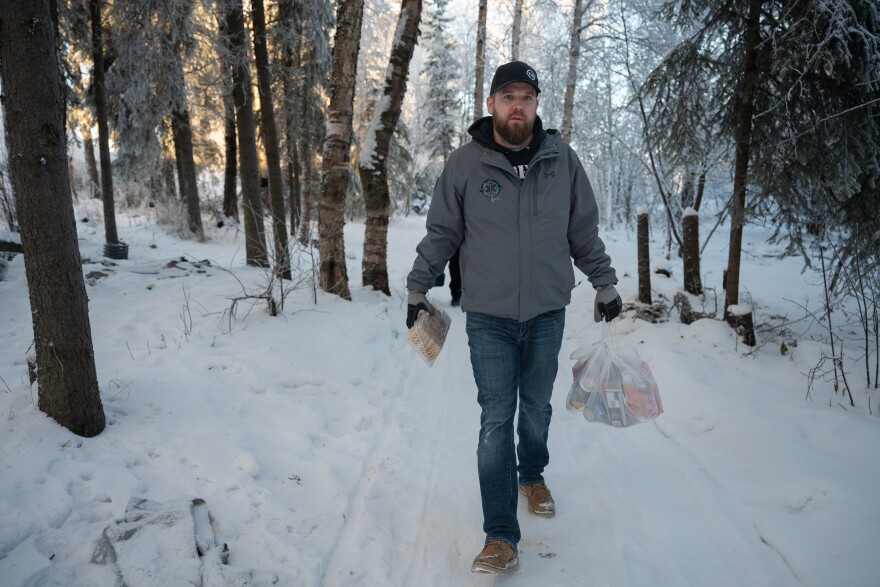Josh Engle was bundled up on one of the first frigid days in October, walking along a forest path to do outreach in a homeless encampment in Anchorage. He approached a man in a weathered coat near several tents and a makeshift structure.
“How long you been out here on the streets?” Engle asked.
“Too long,” the man said.
“You connected with any resources?” Engle asked. The man described the tarp and blankets he’d been able to get.
Engle, a manager and peer support specialist at True North Recovery in Wasilla, hoped to guide people into recovery, if they showed interest. It’s a path Engle knows well because he’s in long-term recovery himself, so he understands how fleeting the window of opportunity can be when someone decides to seek treatment.
Engle supports people in ways that go well beyond what a more traditional therapist or psychiatrist can do. He may text with clients outside business hours, help them find work or get connected with benefits–anything that might lead to recovery. Peer support specialists like Engle — people in recovery themselves— can help people recover from both serious mental illness and substance use disorders, and can reduce healthcare costs.
“I personally really enjoy being able to connect with them on a personal level [as] someone that has walked their path and been in their shoes and ultimately have struggled the way that they're currently struggling,” Engle said.

True North Recovery, where Engle works, aims to hire people with lived experience in recovery not just as peer support specialists, but for every role–from receptionists to health care providers. Research shows that when patients interact with workers with lived experience, it aids recovery.
Peers can sometimes say and see things people without lived experience can’t.
Aaron Surma, executive director of the National Alliance on Mental Illness, or NAMI, in Juneau, trains peer support associates. Surma also experiences mental illness himself. He said psychiatrists and mental health professionals play an important role in supporting recovery and treatment, but there is a strong power difference.
“You're in a small room, you're making intense eye contact, and the dynamic is that you have the expert and the person who needs help, and the experts are taught to not really share about themselves,” Surma said. “Which makes it feel really one sided. It makes you feel like you're being judged and evaluated.”
Surma said he was arrested multiple times during high school and was court-ordered to go to Alcoholics and Narcotics Anonymous meetings. He said hearing peers in those groups was awesome, but things felt different when talking with his formal providers.
“When I was a teenager, I was lighting stuff on fire and buying garbage bags of weed,” Surma said. “So then to go into a small room and talk to somebody who- imagine the counselor from South Park who's saying ‘Drugs are bad, mkay?’ and it's a million miles from what you know.”
He said it’s easier for peers to bridge those gaps in early recovery. Peer support specialists speak the language of addiction and mental illness and also understand the more traditional language of behavioral health professionals.
He said typically those professionals–like therapists and psychiatrists–dole out care in ways that are convenient for the health care system. But peer support is different.
“Recovery isn't just supported in small doses from paid professionals, but it can also happen on our own time, in places that are comfortable to us, in settings that feel more accessible and from people who feel more approachable,” Surma said.
He said peer support relationships don’t have to be formal and the role can also be incredibly healing for the person providing the support. The hard times and challenges someone has faced suddenly have value, if those experiences help someone else.
“The sense of purpose is incredible,” Surma said. “I talk openly about having been suicidal and how to address depression, and people come out of the woodwork because they know that the door is open.”
That sense of purpose is also something peer support specialist Engle has felt deeply in his work.
“There is no way you could have convinced me 10 years ago that all of the damage and chaos that I was causing in people's lives, my loved ones, people I just would cross paths with, that I would be able to use any of that for good,” Engle said. “I thought that was just going to be like a stain on my soul for the rest of my life.”
Instead, now his struggles are a tool to help people and do his job.
At the Anchorage encampment, Engle approached a couple’s tent. They said they were interested in a detox program but wanted to go together.
“It’s gonna be tough,” Engle said. “But what we can do is we can line it up so, like, beds on the same date. They're just going to be different programs.”
But the couple said they had more to do before committing to detox.
“I swear, every single time we talk: ‘almost there, almost there.’ I know you are,” Engle said, his voice taking on the loving but firm tone of an older brother.
It wasn’t enough to get them into a program, but he’ll be back working to make their next steps in recovery as easy as possible when they’re ready.


